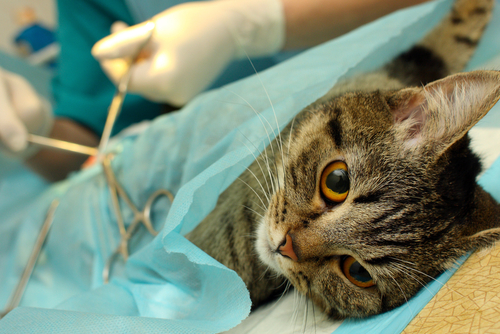What is Early Sterilization for Pets?


Written and verified by the lawyer Francisco María García
Learn a Little More About Sterilization
Sterilization is a surgical intervention with the purpose of extirpating the males and females’ sexual organs. The males have their testicles removed (castration). And the ovaries and the uterus are removed from the females (spaying). It consists of a short procedure performed under general anesthesia.
Obviously, its main objective and logical purpose is to control the animal’s reproductive abilities. Sterilization is essential in avoiding the overpopulation of strays and in combating abuse and abandonment practices. In fact, in many countries, massive free sterilization campaigns have been extremely beneficial.

Steriliziation appears to be the most effective way to prevent and control significant diseases. Examples of these diseases are tumors, infections, dysplasia, epilepsy, hemophilia, venereal diseases, etc. This is especially the case when owners choose early sterilization for their pets.
Often times, the motives for sterilization are not biological or physical, but instead have to do with the animal’s behavior. A large number of pets must be sterilized in order to balance their temperament and reduce the risk for aggressive behavior. Early sterilization also allows owners to prevent the appearance of these behaviors.
What is Early Sterilization?
Early sterilization must be carried out before the animal reaches sexual maturity, which happens when they are between six and eight months old. The exact recommended age varies according to each pet’s sex, age, size and state of health. It is usually performed when cats and dogs are between three or four months old, whether male or female.

Another advantage for puppies is that they require less anesthetics and sedatives. The small amounts that vets use make their recovery faster and more efficient. Puppies can go back to playing normally just a few hours after surgery. In addition, contrary to old popular beliefs, the size of the animal’s organs does not hinder or harm the operation.
Benefits of Early Sterilization
- Females stop experiencing radical hormonal changes during the periods of time when they are in heat, and also avoid so-called psychological pregnancies. Not only will your pet be calmer, but she will stop attracting other males and will not dirty your home.
- In males, early sterilization significantly reduces their need to escape and mark foreign territory, or to pursue females during this cycle.
- Most dogs and cats that receive early sterilization become more affectionate and less uncouth throughout their lives.
- Early sterilization tends to favor our pets’ training and socialization. It is because of this that almost all service or show dogs endure early sterilization.
- Unsterilized females are three times more likely to suffer from ovarian, breast and uterine cancers than females that are sterilized at an early age. The same is true for males when it comes to prostate cancer.
Myths about Early Sterilization in Pets
There are a great number of myths about the negative effects of early sterilization in pets. Accounts about the disadvantages of this procedure are quite rare. And, they do not justify exposing the animal to more specific risks, such as degenerative or terminal diseases.
For example: it is a myth that all sterilized pets become obese or overweight. There is certainly a tendency for weight gain after the operation. However, it is perfectly controllable with the adoption of healthy habits. For instance: a balanced diet and a regular incorporation of physical activity.
The biggest risk of sterilization lies in performing the surgery too late in the animal’s life. An elderly animal undergoing sterilization can present a number of complications. It is extremely important to consider the pet’s age when determining the health benefits of early sterilization. And, ensure the well-being of our most faithful companion.
It is worth remembering that you should not schedule any procedures for your animal without having a consultation with a trusted veterinarian, first. Additionally, early sterilization in no way diminishes the need for a good education and an adequate socialization process.
Learn a Little More About Sterilization
Sterilization is a surgical intervention with the purpose of extirpating the males and females’ sexual organs. The males have their testicles removed (castration). And the ovaries and the uterus are removed from the females (spaying). It consists of a short procedure performed under general anesthesia.
Obviously, its main objective and logical purpose is to control the animal’s reproductive abilities. Sterilization is essential in avoiding the overpopulation of strays and in combating abuse and abandonment practices. In fact, in many countries, massive free sterilization campaigns have been extremely beneficial.

Steriliziation appears to be the most effective way to prevent and control significant diseases. Examples of these diseases are tumors, infections, dysplasia, epilepsy, hemophilia, venereal diseases, etc. This is especially the case when owners choose early sterilization for their pets.
Often times, the motives for sterilization are not biological or physical, but instead have to do with the animal’s behavior. A large number of pets must be sterilized in order to balance their temperament and reduce the risk for aggressive behavior. Early sterilization also allows owners to prevent the appearance of these behaviors.
What is Early Sterilization?
Early sterilization must be carried out before the animal reaches sexual maturity, which happens when they are between six and eight months old. The exact recommended age varies according to each pet’s sex, age, size and state of health. It is usually performed when cats and dogs are between three or four months old, whether male or female.

Another advantage for puppies is that they require less anesthetics and sedatives. The small amounts that vets use make their recovery faster and more efficient. Puppies can go back to playing normally just a few hours after surgery. In addition, contrary to old popular beliefs, the size of the animal’s organs does not hinder or harm the operation.
Benefits of Early Sterilization
- Females stop experiencing radical hormonal changes during the periods of time when they are in heat, and also avoid so-called psychological pregnancies. Not only will your pet be calmer, but she will stop attracting other males and will not dirty your home.
- In males, early sterilization significantly reduces their need to escape and mark foreign territory, or to pursue females during this cycle.
- Most dogs and cats that receive early sterilization become more affectionate and less uncouth throughout their lives.
- Early sterilization tends to favor our pets’ training and socialization. It is because of this that almost all service or show dogs endure early sterilization.
- Unsterilized females are three times more likely to suffer from ovarian, breast and uterine cancers than females that are sterilized at an early age. The same is true for males when it comes to prostate cancer.
Myths about Early Sterilization in Pets
There are a great number of myths about the negative effects of early sterilization in pets. Accounts about the disadvantages of this procedure are quite rare. And, they do not justify exposing the animal to more specific risks, such as degenerative or terminal diseases.
For example: it is a myth that all sterilized pets become obese or overweight. There is certainly a tendency for weight gain after the operation. However, it is perfectly controllable with the adoption of healthy habits. For instance: a balanced diet and a regular incorporation of physical activity.
The biggest risk of sterilization lies in performing the surgery too late in the animal’s life. An elderly animal undergoing sterilization can present a number of complications. It is extremely important to consider the pet’s age when determining the health benefits of early sterilization. And, ensure the well-being of our most faithful companion.
It is worth remembering that you should not schedule any procedures for your animal without having a consultation with a trusted veterinarian, first. Additionally, early sterilization in no way diminishes the need for a good education and an adequate socialization process.
This text is provided for informational purposes only and does not replace consultation with a professional. If in doubt, consult your specialist.








